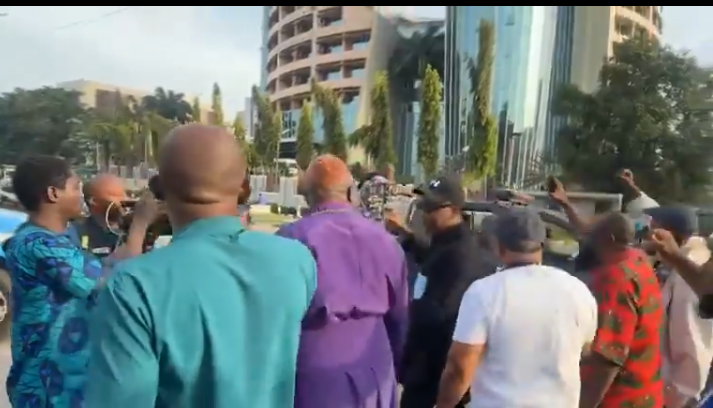
Justice at the Door: Killaboi Extradited as Grieving Mother of Late Augusta Breaks Silence After Two Years

In an emotional turn of events that has gripped the nation, Mrs. Cordelia Okonye, the heartbroken mother of the late 21-year-old Augusta Onuwabhagbe, has finally found a glimmer of solace as her daughter’s alleged killer, Benjamin Best Nnayereugo—popularly known as Killaboi—has been extradited to Nigeria. The accused, who had been on the run since July 2023 after the brutal murder of Augusta in Lagos, was extradited from Doha, Qatar, on Saturday, April 19, 2025, marking a major breakthrough in a case that has sparked outrage, sorrow, and calls for justice across Nigeria.
Augusta, a first-class student at Lead City University, Ibadan, was reportedly murdered by her lover, Killaboi, at his residence in the Ajah area of Lagos. The gruesome incident sent shockwaves throughout social media when the suspect vanished into thin air, leaving behind confusion, anger, and heartbreak. He was declared wanted by the Nigerian Police in July 2023, initiating a relentless international manhunt that would span multiple countries and nearly two years of tireless investigation.
As news of Killaboi’s extradition broke, Mrs. Okonye took to Facebook to express her feelings—not in anger, but with a divine sense of peace and unwavering hope in justice. Her post read: “YOUR VICTORY IS SURE WHEN GOD IS INVOLVED ESPECIALLY IF YOU ARE INNOCENT AND OF A PURE HEART. You will surely testify!” The words, simple yet powerful, echo the enduring pain of a mother who lost her daughter under tragic and unimaginable circumstances. It also resonates as a testimony of faith and a belief that justice—no matter how delayed—can still prevail.
Augusta’s murder was not just another statistic—it became a symbol of lost potential, domestic violence, and the darker sides of relationships shrouded in secrecy and manipulation. The young woman was described by those who knew her as bright, cheerful, and focused, with a promising future that was suddenly cut short. The fact that she was a high-achieving student made the loss all the more painful, and her death ignited a nationwide conversation about gender-based violence, safety, and the failure of systems meant to protect young women.
Killaboi’s flight from justice only worsened public anger. For months, Nigerians on social media demanded his arrest, sharing photos, timelines, and alleged sightings in hopes that authorities would bring him to book. The trail grew cold at several points, with many fearing that the case would become yet another unresolved tragedy. But behind the scenes, INTERPOL and Nigerian law enforcement were quietly working, tracing digital footprints, and following leads that would eventually unmask him in Qatar—living under a false identity.
The extradition was confirmed by the Nigerian Police Force, with Inspector-General of Police, Kayode Egbetokun, assuring Nigerians that the suspect would face full prosecution under the law. He also reaffirmed the police’s commitment to ensuring that no individual, regardless of status or location, escapes accountability. The IGP’s statement brought a sense of closure to a public that has followed the case with intense interest and emotion.
As Killaboi returns to Nigerian soil, the legal battle ahead is expected to be both high-profile and emotionally charged. For Mrs. Okonye, this moment represents not just the return of a suspect, but the reawakening of a fight for truth and justice. Her dignity, strength, and faith throughout this ordeal have become a beacon for other grieving families still awaiting justice for their loved ones.
This case also underscores the increasing importance of international cooperation in criminal justice. Without the efforts of INTERPOL and collaborative action between countries, a fugitive like Killaboi could have vanished permanently into anonymity. The fact that he was caught while using a fake identity in a foreign land speaks volumes about the determination of law enforcement to bring perpetrators of heinous crimes to justice, no matter how far they run or how deeply they try to hide.
For now, Nigeria watches and waits. The road to justice is rarely smooth, and the courtroom proceedings will test the strength of evidence, the efficiency of the system, and the resilience of a mother who has carried this weight for far too long. The face of Augusta, forever frozen in youthful brilliance, will loom over every hearing, every testimony, and every verdict. Her story, though tragically ended, continues to speak through her mother, her friends, and a nation that refuses to forget.
As the legal process begins in earnest, one thing remains clear: justice delayed may be justice denied—but it can still be justice delivered. For Augusta, for her family, and for every victim of violence whose voice has been silenced, this extradition is not just about one man facing the consequences of his actions. It’s about accountability, healing, and a system rising—however slowly—to meet its responsibility.
In a time when public trust in the justice system is often strained, this development reignites hope. Hope that justice may yet come, no matter how long it takes. Hope that mothers like Mrs. Okonye will not cry in vain. And hope that, perhaps one day, stories like Augusta’s will no longer need to be written.


